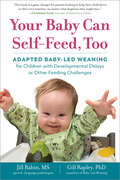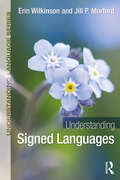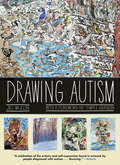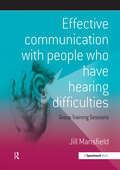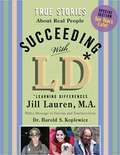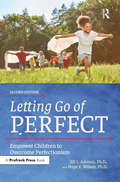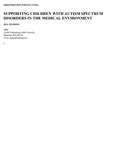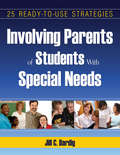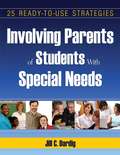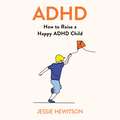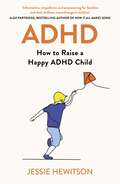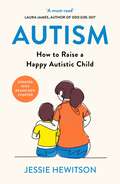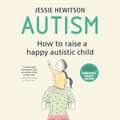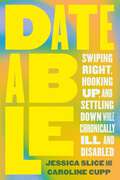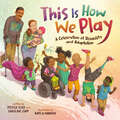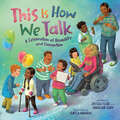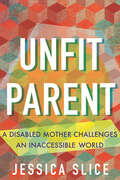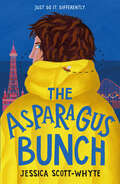- Table View
- List View
Your Baby Can Self-Feed, Too: Adapted Baby-led Weaning For Children With Developmental Delays Or Other Feeding Challenges (The Authoritative Baby-Led Weaning Series #0)
by Gill Rapley Jill RabinNo matter what challenges they face, your baby can self-feed, too! One in four children has feeding challenges and difficulty eating. If your child is one of them, mealtimes may be a struggle. Whether the reason is neurodiversity (such as Down syndrome), feeding aversion, or a medical condition, feeding therapist Jill Rabin and baby-led weaning pioneer Gill Rapley are here to help with a groundbreaking new approach for parents, caregivers, and health professionals alike: adapted baby-led weaning (ABLW). Find out how to: Respond to your baby’s signals and appetite—and trust their abilities. Improve your baby’s chewing, posture, sensory development, and fine motor skills. Use “bridge devices,” like silicone feeders, to encourage independent eating. Support your baby to eat real, healthy food and enjoy mealtimes with the rest of the family.
Understanding Signed Languages (Understanding Language)
by Jill P. Morford Erin WilkinsonUnderstanding Signed Languages provides a broad and accessible introduction to the science of language, with evidence drawn from signed languages around the world. Readers will learn about language through a unique set of signed language studies that will surprise them with the diversity of ways human languages achieve the same functional goals of communication. Designed for students with no prior knowledge of signed languages or linguistics, this book features: A comprehensive introduction to the sub-fields of linguistics, including sociolinguistics, linguistic structure, language change, language acquisition, and bilingualism; Examples from more than 50 of the world’s signed languages and a brief “Language in Community” snapshot in each chapter highlighting one signed language and the researchers who are documenting it; Opportunities to reflect on how language ideologies have shaped scientific inquiry and contributed to linguistic bias; Review and discussion questions, useful websites, and pointers to additional readings and resources at the end of each chapter. Understanding Signed Languages provides instructors with a primary or secondary text to enliven the discourse in introductory classes in linguistics, interpreting, deaf education, disability studies, cognitive science, human diversity, and communication sciences and disorders. Students will develop an appreciation for the language-specific and universal characteristics of signed languages and the global communities in which they emerge.
Drawing Autism
by Jill MullinThis &“jaw-droppingly beautiful book&” explores the work and creative process of artists diagnosed with ASD, with a foreword by Temple Grandin (Library Journal). In this volume, behavior analyst and educator Jill Mullin has assembled a staggering array of work from established artists with autism like Gregory Blackstock and Jessica Park—as well as many who are unknown but no less talented. Their creations, coupled with artist interviews, comprise a fascinating and compelling book that serves to educate and inspire anyone who knows someone diagnosed with ASD. Mullin&’s introduction and the foreword by bestselling author Temple Grandin also provide an overview of autism, and advocate for nurturing the talents, artistic and otherwise, of autistic individuals. &“What is the actual experience of living with autism in a deep-felt sense, beyond the social stereotypes and headline-worthy superskills? Drawing Autism, a celebration of the artistry and self-expression found in artwork by people diagnosed with autism, explores just that. The stunning volume features works by more than fifty international contributors, from children to established artists, that illustrate the rich multiplicity of the condition.&” —The Atlantic &“Mullin . . . brings together fascinating works by 40 artists on the spectrum with their answers to her questions about their process.&” —The Boston Globe &“A testament to the power of art to reveal the inner world of people living with ASD.&” —Publishers Weekly
Effective Communication with People Who Have Hearing Difficulties: Group Training Sessions
by Jill MansfieldOne in seven people in the UK are said to be deaf or hard of hearing. Too often, clients are put off attending centres or have had bad experiences of services and communicating with care or teaching staff. Working through the sessions in this book will enable the reader to understand how to communicate effectively, how to treat individuals with respect and dignity in all types of settings, and how to encourage positive communication with people who have hearing difficulties. The author has used her own experience of deafness to convey the effects it can have on individuals and to give insight into how people with hearing difficulties like to communicate and be treated. Divided into twenty sessions for group training, individuals can also work through the book on their own. The information, exercises, and case studies in this book will provide the reader with the awareness and knowledge to communicate effectively with people who have hearing difficulties. Featuring many cartoon-style illustrations, this photocopiable manual is essential reading for anyone who comes into contact with people who have hearing problems.
Succeeding With LD: True Stories About Real People With Ld
by Jill LaurenJill Lauren profiles amazing individuals who live with a learning disability and have effectively conquered their challenges to achieve success. These moving biographical sketches highlight the stories of a remarkable group of youth and adults who lead fulfilling lives because of their hard work, courage, and resilience. These inspiring people describe the resources they used to focus on their strengths and to persevere. Their poignant, real-life stories generate empathy and understanding in the community and stress the importance of a strong support network. First published in 1997, this new edition includes a 10-years later; update on each individual profiled.
Letting Go of Perfect: Empower Children to Overcome Perfectionism
by Jill L. Adelson Hope E. WilsonLetting Go of Perfect gives parents and teachers the guidance and support they need to help children break free of the anxieties and behaviors related to perfectionism. This second edition:Explores a state of mind that manifests in unhealthy ways among kids and teens today—the need to be perfect.Features updated research on perfectionism, new strategies, and resources.Delineates the major types of perfectionism and provides practical tips.Explains how students can use their perfectionistic behaviors in a healthy way.Shares advice and stories from real parents, educators, and students.For children who believe their best is never good enough, perfectionism can lead to excessive guilt, lack of motivation, low self-esteem, depression, pessimism, obsessive or compulsive behavior, and a sense of rigidity. This engaging, practical book is a must-have for parents and teachers wanting to help children overcome perfectionism, raise self-confidence, lessen guilt, increase motivation, and offer a future free of rigidity.
How It Feels to Live With a Physical Disability
by Jill KrementzKrementz shows through interviews, the indomitable spirit and strength of children living with such physical disabilities as blindness, cerebral palsy, paralysis, and missing limbs. Other books by this author are available in this library, including several from the "How It Feels" series.
I Know How It Feels to Fight for Your Life
by Jill KrementzThis book presents first-person accounts by fourteen children (ages seven to sixteen) who live with chronic illnesses and/or disabilities. The conditions include leukemia, spina bifida, juvenile diabetes, juvenile rheumatoid arthritis, lupus, and kidney failure. The stories are very positive and pubeat. Most of the children emphasize the importance of the support they have received from family and friends.
Prescription for Success: Supporting Children With Autism Spectrum Disorders in the Medical Environment
by Jill HudsonBecause of the unique needs of children with ASD, it is important to pay special attention to the details of their experience in the medical environment. Designed to help make the medical experience easier for all involved, this book presents information on ASD, the varying developmental levels, interventions, and assessments that medical staff, parents, educators, and key service providers can use to more effectively interact with and support children with ASD while in the medical setting.
One Classroom, Many Cultures
by Elizabeth Massie Jill DubinThe reader discovers many different types of people, their personal characteristics, and their customs inside a classroom in this book.
Involving Parents of Students With Special Needs: 25 Ready-to-Use Strategies
by Jill C. DardigBridge the communication gap with parents of children with special needs! The author provides 25 ready-to-use techniques for involving parents in the education of their children. General and special education teachers in Grades PreK–12 can use these strategies to reach the parents of students with a wide range of learning needs. This teacher-friendly resource provides sample materials and tips for: Using letters, telephone, email, newsletters, and progress reports to communicate with parents Conducting parent conferences and in-person meetings Connecting parents with resources Helping parents teach their children at home Dealing with home/school conflicts Preparing a parent involvement action plan
Involving Parents of Students with Special needs: 25 Ready-to-Use Strategies
by Jill C. DardigThis book helps readers with real-world situations. It is easy and user-friendly, this book provides strategies and tools to aid in communicating with parents.
Eyes at My Feet
by Jessie HickfordFrom the Book Jacket: In my work as a veterinary surgeon I regularly examine and treat guide dogs and I always find something humbling in the cheerfulness of the blind people and their pride in the wonderful animals which serve as their eyes. But not until now have I had the opportunity to read how one of these partnerships developed. With no trace of self pity Jessie Hickford takes us with her through the early difficult days of her training with her dog Prudence; and surely no writer has more movingly described the flowering of companionship and love between animal and mistress as they gradually adjust to each other. I like to write about animals and I enjoy reading about them too, so this is a book for me and for all the thousands who share my tastes. 'It is not a sad book, it is a happy one because it is a story of ultimate triumph ; and I do not know which character captivated me most the brave woman who wrote it or the beautiful dog she has never seen. JAMES HERRIOT Author of ALL CREATURES GREAT AND SMALL
I Never Walked Alone
by Jessie HickfordIn this sequel to Eyes at My Feet, the author tells further adventures she had with her golden retriever German Shepherd cross guide dog Prudence. She talks about their presentations and talks to different civic groups, their vacations at the sea, some mishaps with water, and the final sadness and transition between Prudence and her successor Suki. Heartwarming and truly written for any dog lover.
ADHD: How to Raise a Happy ADHD Child
by Jessie HewitsonInformative, empathetic and empowering for families and their brilliant neurodivergent children. Alex Partridge, bestselling author of Now It All Makes SenseA must-read for every parent or teacher of a child with ADHD. Lisa Lloyd, bestselling author of Raising the SEN-BetweenersIs your ADHD child struggling at school? Do they make friends, but find it difficult to keep them? Do your attempts to get them off their screens end in tears (and that's just you)? Jessie Hewitson, award-winning journalist, ADHDer and parent to two fantastically neurodivergent children, has been there.Here she asks whether ADHD is over diagnosed, is medication the solution, and how can parents best support ADHD kids to become the happiest version of themselves at school, in their friendships, and at home.For more than a decade Jessie has been on a quest to better understand neurodivergent happiness and the many barriers young ADHD people face in finding it. Now she shares everything she has learned, including interviews with world-leading scientists, researchers and experts in the field. Combined with her own personal experience, ADHD will empower you to centre happiness in what can be a more complicated and ultimately more rewarding parenting journey.
ADHD: How to Raise a Happy ADHD Child
by Jessie HewitsonInformative, empathetic and empowering for families and their brilliant neurodivergent children. Alex Partridge, bestselling author of Now It All Makes SenseA must-read for every parent or teacher of a child with ADHD. Lisa Lloyd, bestselling author of Raising the SEN-BetweenersIs your ADHD child struggling at school? Do they make friends, but find it difficult to keep them? Do your attempts to get them off their screens end in tears (and that's just you)? Jessie Hewitson, award-winning journalist, ADHDer and parent to two fantastically neurodivergent children, has been there.Here she asks whether ADHD is over diagnosed, is medication the solution, and how can parents best support ADHD kids to become the happiest version of themselves at school, in their friendships, and at home.For more than a decade Jessie has been on a quest to better understand neurodivergent happiness and the many barriers young ADHD people face in finding it. Now she shares everything she has learned, including interviews with world-leading scientists, researchers and experts in the field. Combined with her own personal experience, ADHD will empower you to centre happiness in what can be a more complicated and ultimately more rewarding parenting journey.
ADHD: How to Raise a Happy ADHD Child
by Jessie HewitsonInformative, empathetic and empowering for families and their brilliant neurodivergent children. Alex Partridge, bestselling author of Now It All Makes SenseA must-read for every parent or teacher of a child with ADHD. Lisa Lloyd, bestselling author of Raising the SEN-BetweenersIs your ADHD child struggling at school? Do they make friends, but find it difficult to keep them? Do your attempts to get them off their screens end in tears (and that's just you)? Jessie Hewitson, award-winning journalist, ADHDer and parent to two fantastically neurodivergent children, has been there.Here she asks whether ADHD is over diagnosed, is medication the solution, and how can parents best support ADHD kids to become the happiest version of themselves at school, in their friendships, and at home.For more than a decade Jessie has been on a quest to better understand neurodivergent happiness and the many barriers young ADHD people face in finding it. Now she shares everything she has learned, including interviews with world-leading scientists, researchers and experts in the field. Combined with her own personal experience, ADHD will empower you to centre happiness in what can be a more complicated and ultimately more rewarding parenting journey.
Autism: How to raise a happy autistic child
by Jessie Hewitson'A wise SatNav for what is often a bewildering, or even scary, zone of parenting. The book offers real-world, road-tested, child-first and family-friendly advice; while also highlighting the twin truths that autism is not a tragedy, and that adaptation and acceptance are not resignation' David Mitchell, bestselling author and co-translator of The Reason I Jump'A must-read for anyone with an autistic child in their life' Laura James, author of Odd Girl OutWritten by Jessie Hewitson, an award-winning journalist at The Times, Autism is the book she wishes she had read when her son was first given the diagnosis of autism spectrum disorder.It combines her own experiences with tips from autistic adults, other parents - including author David Mitchell - as well as advice from autism professionals and academics such as Professor Simon Baron-Cohen. Autism looks at the condition as a difference rather than a disorder and includes guidance on:· What to do if you think your child is autistic · How to understand and support your child at school and at home · Mental health and autism · The differences between autistic girls and boys'It is incredibly useful and informative, full of new research and interviews that put right an awful lot of misinformation. I cannot recommend this highly enough' The Sun'Exceptionally useful and informative' Uta Frith, Emeritus Professor of Cognitive Development, UCL
Autism: How to raise a happy autistic child
by Jessie Hewitson'A wise SatNav for what is often a bewildering, or even scary, zone of parenting. The book offers real-world, road-tested, child-first and family-friendly advice; while also highlighting the twin truths that autism is not a tragedy, and that adaptation and acceptance are not resignation' David Mitchell, bestselling author and co-translator of The Reason I Jump'A must-read for anyone with an autistic child in their life' Laura James, author of Odd Girl OutWritten by Jessie Hewitson, an award-winning journalist at The Times, Autism is the book she wishes she had read when her son was first given the diagnosis of autism spectrum disorder.It combines her own experiences with tips from autistic adults, other parents - including author David Mitchell - as well as advice from autism professionals and academics such as Professor Simon Baron-Cohen. Autism looks at the condition as a difference rather than a disorder and includes guidance on:· What to do if you think your child is autistic · How to understand and support your child at school and at home · Mental health and autism · The differences between autistic girls and boys'It is incredibly useful and informative, full of new research and interviews that put right an awful lot of misinformation. I cannot recommend this highly enough' The Sun'Exceptionally useful and informative' Uta Frith, Emeritus Professor of Cognitive Development, UCL
Autism: How to raise a happy autistic child
by Jessie Hewitson'A wise SatNav for what is often a bewildering, or even scary, zone of parenting. The book offers real-world, road-tested, child-first and family-friendly advice; while also highlighting the twin truths that autism is not a tragedy, and that adaptation and acceptance are not resignation' David Mitchell, bestselling author and co-translator of The Reason I Jump'A must-read for anyone with an autistic child in their life' Laura James, author of Odd Girl OutThe definitive guide for parents of autisic children, written from the perspective of neurodiversity. Written by Jessie Hewitson, an award-winning journalist at The Times, Autism is the book she wishes she had read when her son was first given the diagnosis of autism spectrum disorder.It combines her own experiences with tips from autistic adults, other parents - including author David Mitchell - as well as advice from autism professionals and academics such as Professor Simon Baron-Cohen. Autism looks at the condition as a difference rather than a disorder and includes guidance on:· What to do if you think your child is autistic · How to understand and support your child at school and at home · Mental health and autism · The differences between autistic girls and boys'Jessie Hewitson has really hit the mark with this book, giving our history, our diversity, our challenges and our hopes. Autistic people and their families are finally represented' Carrie Grant'Exceptionally useful and informative' Uta Frith, Emeritus Professor of Cognitive Development, UCLRead by Lucy Scott(p) Orion Publishing Group 2018
Dateable: Swiping Right, Hooking Up, and Settling Down While Chronically Ill and Disabled
by Jessica Slice Caroline CuppA much-needed guide for disabled and chronically ill people to dating - from apps to hooking up, sex, and more - from disabled essayist and author Jessica Slice and bioethicist Caroline Cupp. Disabled people date, have casual sex, marry, and parent. Yet our romantic lives are conspicuously absent from the media and cultural conversation. Sexual education does not typically address the specific information needed by disabled students. Mainstream dating apps fail to include disability as an aspect of one&’s identity alongside race, ethnicity, gender identity, and sexual orientation. The few underutilized disability-focused apps are paternalistic and unappealing. Bestselling dating books do not address disability, and the few relationship books marketed to disabled people focus on the mechanics of sex rather than the complex interactions that create the conditions for it. In Dateable, disabled authors Jessica Slice Caroline Cupp team up to address the serious gap in the dating space. Dateable is the first book on disabled dating and relationships; it&’s a dating guide made especially for disabled and chronically ill people, that also calls in nondisabled readers. Jessica and Caroline take on everything from rom-com representation and dating apps to sex and breakups with a strong narrative underpinning and down-to-earth advice. The book is as much a practical tool as it is an empowering guide.
This Is How We Play: A Celebration of Disability and Adaptation
by Jessica Slice Caroline CuppA jubilant, inclusive, luminously illustrated picture book that features families at play, each with a family member who has a disability.With love and adaptation, this is how we play! This joyful read-aloud with an empowering refrain, from disability rights activists Jessica Slice and Caroline Cupp, demystifies and respects how disabled people and their families use adaptive, imaginative, and considerate play so everyone can join in the fun.Back matter consists of a kid-friendly guide to thinking, learning, and talking about disability; a glossary of the different disabilities represented throughout the book; and a guide for grown-ups on ways to encourage discussions about disabilities with the children in their lives. Throughout, This Is How We Play centers, affirms, and encourages the disabled children and adults who are already doing the challenging work of advocating for themselves and finding strength in community.
This Is How We Talk: A Celebration of Disability and Connection
by Jessica Slice Caroline CuppFrom the creators of This Is How We Play is a new jubilant, inclusive, luminously illustrated picture book that celebrates all the ways we communicate with each otherWe sign, write, clap! We tap, stim, scream! So many ways to talk and joke, play and learn and dream. This joyful read-aloud, with an empowering refrain, from disability rights activists Jessica Slice and Caroline Cupp, demystifies and respects how disabled people and their families use different forms of communication to connect and show love.Back matter consists of a kid-friendly guide to thinking, learning, and talking about disability and communication; a glossary of the different disabilities represented throughout the book; and a guide for grown-ups on ways to encourage discussions about disabilities with the children in their lives. Throughout, This Is How We Talk centers, affirms, and encourages the disabled children and adults who are already doing the challenging work of advocating for themselves and finding strength in community.
Unfit Parent: A Disabled Mother Challenges an Inaccessible World
by Jessica Slice&“A glorious, revelatory book.&”—Ed Yong, Pulitzer Prize–winning journalist and author of An Immense World&“A beautiful, transformative book about being a parent in a world that rejects frailty and weakness.&”—Rachel Aviv, staff writer at the New YorkerA paradigm shifting look at the landscape of disabled parenting—the joys, stigma, and discrimination—and how disability culture holds the key to transforming the way we all raise our kidsJessica Slice&’s disability is exactly what her child needed as a newborn. After becoming disabled a handful of years prior from a shift in her autonomic nervous system, Jessica had done the hard work of disentangling her worth from productivity and learning how to prepare for an unpredictable and fragile world. Despite evidence to the contrary, nondisabled people and systems often worry that disabled people cannot keep kids safe and cared for, labeling disabled parents &“unfit,&” but disabled parents and culture provide valuable lessons for rejecting societal rules that encourage perfectionism and lead to isolation.Blending her experience of becoming disabled in adulthood and later becoming a parent with interviews, social research, and disability studies, Slice describes what the landscape is like for disabled parents. From expensive or non-existent adaptive equipment to inaccessible healthcare and schools to the terror of parenting while disabled in public and threat of child protective services, Slice uncovers how disabled parents, out of necessity, must reject the rules and unrealistic expectations that all parents face. She writes about how disabled parents are often more prepared than nondisabled parents to navigate the uncertainty of losing control over bodily autonomy. In doing so, she highlights the joy, creativity, and radical acceptance that comes with being a disabled parent.While disabled parents have been omitted from mainstream parenting conversations, Slice argues that disabled bodies and minds give us the hopeful perspectives and solutions we need for transforming a societal system that has left parents exhausted, stuck, and alone.
The Asparagus Bunch
by Jessica Scott-WhyteA fresh and irreverent comedy starring a cast of neurodiverse characters – guaranteed to be one of the funniest novels you'll read this year. Leon John Crothers is 4779 days old (thirteen years and one month, if you're mathematically challenged). He has been 'moved on' from six different schools and most people think he has an attitude problem. Leon doesn't care for the label, in the same way that he doesn't care for Tim Burton, supermarket trolleys, train fanatics or Bounty bars.This time, however, things may turn out differently, as help comes from where he least expects it – Dr Snot, a physician at pains to help Leon navigate 'normal' and classmates, Tanya and Lawrence, who both face their own challenges. When school bully Glen Jenkins humiliates Leon in the school canteen and almost destroys Lawrence, Leon very reluctantly agrees to the formation of a club, The Asparagus Bunch.How Leon manages to navigate school woes and family drama – and astonishingly ends up with not one but two friends – is nothing short of a miracle, or maybe just simply down to being different.Shortlisted for the AN Post Irish Book Awards 2022 Shortlisted for the Juniper Book Awards 2023
